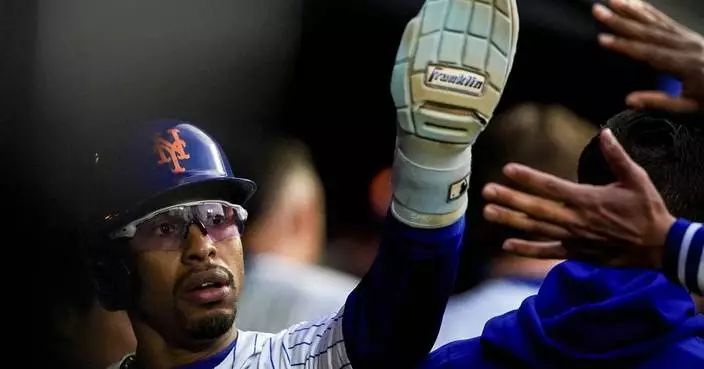Evita was bought a therapy dog to help her cope with Nutcracker syndrome, a rare condition causing her agonising pain.
A brilliant student, destined to become a quantum physicist, whose life has been blown apart by a rare chronic illness causing agonising pain has told how a shaggy sheepdog has become her salvation.
Diagnosed with median arcuate ligament syndrome (MALS), May-Thurner syndrome and nutcracker syndrome (NCS), in October 2017 –all of which affect the kidney and abdominal area and cause excruciating pain – Evita Gamber, 22, who is studying mathematics and physics at University College London, was devastated.
Desperate to help her ailing daughter, in July 2018 her teaching assistant mum Anette , 47, took her to Tuscany in Italy on holiday, where they met Bo, a Maremma Sheepdog puppy, then six-weeks-old – and she fell in love.
Evita, who now lives in Oval, south London, with Anette and Bo, said: “We were renting a house in Tuscany and met a local farmer who had dogs.
“They are not normally friendly towards people, but the older dog immediately came up to me and we had a real connection.
“So, at the end of our stay, the farmer kindly said to us that I should take one of the dog’s puppies and I chose Bo, because I felt like he and I had been close.”
Now, Bo is set to be trained as an assistance dog, so he can tend to Evita’s growing needs.
She continued: “He is already hugely helpful to me. I’m quite tough and don’t like to show when I’m struggling, but he detects these things, so stays close and watches me to make sure I’m OK.
“There are also times when I pass out from exhaustion or pain and he is there to either try to rouse me, or go and alert other people.”
She continued: “But most importantly, he’s an excellent friend to me. There are times with this condition that I feel very alone and having him though helps me to stay strong and try and get through this hellish illness.”
When Evita first moved to London to study in September 2015, she was planning to spend her three years at university making new friends and working hard, so she might one day become an academic in quantum gravity.
When a mysterious and persistent pain in her abdomen developed the following summer, she was horrified to discover that what she had believed to be indigestion was actually a serious condition, which would seriously disrupt the next few years of her life.
“I had never had any kind of illness before. Kids at school used to joke that I was never ever ill, apart from the very rare occasion when I might catch flu,” she explained.
“And so I didn’t go to the doctors about it for some time, even though the pain was quite severe, because I just thought, ‘I’m not the kind of person who ever really gets ill.'”
When a week of pain was compounded by nausea, she finally saw her doctor, who could not find anything obvious wrong.
But, as the weeks wore on, the pain continued – becoming so extreme that in November she took herself to A&E in London four times, only to be told by medical experts that there was nothing overtly the matter with her and that she should just take pain killers.
By Christmas, her weight had also dropped slightly, from 52kg to 48kg (8st 2lb to 7st 6lb), as eating made the pain worse and Evita was now seriously concerned about her health, which was affecting both her work and leisure.
An ultramarathon runner before falling ill, she said: “Everything was starting to get very difficult for me as I was in constant pain.”
She continued: “Then on Christmas Day 2015 I experienced another heavy attack of stomach cramps along with pain in my chest, which made me unable to move.
“I went to my local hospital in Germany, where I was spending the festivities, and an ultrasound scan revealed that I was a bit constipated.
“I was advised to take stool softeners and have a colonoscopy at some point, but flew back to London and thought everything would calm down now.”
Instead, she found herself suffering unbearable agony and her constipation – which meant she only went to the bathroom once every two weeks – was stopping her from eating.
Frustrated by the lack of answers she seemed to be getting from the medical profession, she started doing her own research into her symptoms.
Eventually, she found something called vascular compression syndrome – a rare disorder that occurs when a vein or artery is squeezed by another internal part of the body – and, thinking it sounded similar, in October 2017 wrote to a German specialist in the Leipzig.
As a result, in October 2017, Evita was diagnosed with MALS and nutcracker syndrome (NCS) – a form of vascular compression so named because the renal vein that connects the kidney and the heart is ‘cracked’ between two other arteries.
Immediate surgery to reduce the pressure on the celiac and renal arteries was recommended and on November 6 2017 she went under the knife for an eight-hour operation in hospital.
Left with a long scar from the bottom of her rib cage to below her belly button, Evita hoped that now her nightmare would be over.
Unfortunately, though, the surgery was not successful, meaning she needed two further operations within the following two weeks to fix complications of the first surgery.
With a three month recovery period, Evita had to put her studies on hold – still experiencing no reprieve from the constant pain in her left side.
“The abdominal pain went for a short while, but then it became a whole lot worse in the left side of my torso,” said Evita.
She added: “It was so bad – even worse than it had been before my operations – that I was in hospital for months and then at home with my mum in Germany, totally unable to do anything, or even go out of the house.”
Despite still living with constant pain, Evita returned to London in September 2018, to try and complete her studies – with her mum and Bo following them in January 2019 to assist with her care and drive her around, as she could not walk far.
Feeling like “someone is stabbing a knife constantly” into her back, her one real joy is nine-month-old Bo.
She said: “By the time I met Bo, my pain was so bad that I was often fainting and I could rarely leave the house.
“I had been thinking that perhaps it would be a good idea to get a therapy dog, as a way of helping look after me and keeping me company, and when I saw him I knew that he would be perfect.”
With a renal vein transposition – a procedure in which the vein will be moved and hopefully no longer compressed – planned at St Mary’s Hospital, London soon, Evita remains hopeful it could finally relieve her pain.
She said: “Hopefully, this will be a huge step forwards for me, giving me the pain relief I desperately need.
“When I have bad days, I close my eyes and think back to the past, to the summer of 2016 when I was pain-free and able to run and enjoy life.
“I want to get back to that place but, for the moment, I just try to think positively and enjoy the days when the pain isn’t so bad.”
“Having my mum here with me helps a lot, as I am unable to get through the day by myself now.
“And Bo has been wonderful too. It isn’t that he is able to reduce the pain for me, but just having a companion with you through dark times is very comforting.”
Evita is taking civil action and criminal action against Prof. Sandmann, who performed surgery on her in November 2017 at Mettmann Hospital.
Student journalists on the Columbia University campus knew what was coming long before police with riot shields arrived to begin arresting the pro-Palestinian protesters.
They had watched the situation spiral as the protesters stood their ground, refusing to abandon Hamilton Hall and using a pulley system to bring supplies into the building they had occupied.
The reporters, working for university and online U.S. and international publications, suspected negotiations with administrators were going nowhere when the protesters began donning COVID-era masks to hide their identities. Some began sleeping on the floor in journalism classrooms or offices out of fear of missing something.
But when a journalism professor began writing the phone number to call if they were arrested in permanent marker on their arms, that was the moment it became clear: They were capturing history.
The police operation Tuesday night that cleared out Hamilton Hall capped two weeks of drama over the protests at Columbia, which student journalists at the Ivy League school lived through as they were covering it.
Other media were being kept off campus, so these reporters were the only ones who could capture what was happening.
“I just woke up and I was like, I’m going to go and take some pictures,” said Seyma Bayram, a Columbia journalism fellow focused on creating a longform investigative podcast unrelated to the protests.
The encampments were a visual feast. There were musical performances, students reading and helping each other write papers for their classes. She wanted to document it all.
By Monday, students were facing suspension if they didn’t leave. Crowds marched around the encampment chanting. Students were given written notices from the administration, warning them to go. They ripped them up, dumped them in trash bins. Rumors were flying.
That night, Bayram was unwilling to go home, sleeping on her office floor.
“How,” she wondered, “are they going to remove the students. They’re not leaving.”
By Tuesday, she was exhausted. The student reporters charged their cameras and other gear, and waited.
Many protesters were starting to leave, recalled Shayeza Walid, a graduate journalism student at Columbia, who covered the arrests for the news website Al-Monitor.
The sun was setting as they held hands and chanted, knowing they faced academic repercussions by remaining. Many had given up covering their faces by now, Walid said.
To her the chants sounded like a hymn and she saw the protesters, some clad in Palestinian keffiyehs, crying. She doubts she will ever forget it.
“It felt so both inspirational and devastating because these were the kids who were willing to get arrested,” she recalled.
And then police started assembling outside, setting up barricades. Even on campus, Bayram could tell by the photos posted on social media that police action was imminent. And then the police were there.
“I don’t know, it was just like all of a sudden there were just like police, ... riot gear everywhere,” Bayram said.
The student journalists were walking backward, filming as they went, Bayram said.
She was pushed off campus. Police buses and officers were everywhere. Around her, people were being arrested.
“Those of us who are pushed out, like student reporters and faculty, I think we were just all horrified that no press was present outside of, or inside of, Hamilton Hall,” Bayram said.
Walid recalled that the reporters paired up for safety. Her partner, an international student, had never seen so many police in one place. “And frankly, I hadn’t either,” Walid said.
She said the police also seemed shocked when they came into campus and saw how few students were left. “It was very evidently disproportionate from where we were standing,” she said.
Before the arrests, protesters inside the campus used a megaphone to lead those protesting outside in chants, recalled Cecilia Blotto, a graduate journalism student, who has been publishing photos and video to Uptown Radio, a project of the university's journalism program.
“Columbia, you are a liar," she recalled them chanting, along with “Disclose, divest! We will not stop, we will not rest.”
Then Blotto saw a police buses pull up, officers exiting with shields and zip ties. Then they played a recording saying that if the protesters didn’t disperse they would be arrested.
“People were like being dragged out on the street, with like four cops holding a leg and an arm each. I saw some really, like, striking images of people, like, yelling shame at the cops, while they were dragging out students,” Blotto said. She tried to film it all.
Student radio host Macyn Hanzlik-Barend said having reporters on the scene was important to communicate what was happening at Columbia that night.
“It was not just an outside media outlet,” Hanzlick-Berand said. “It was students watching this happen to their own community and having enough poise and maturity to report live in that moment.”
Emily Byrski, a graduate student who had a phone number written on her arm in case she was arrested, said the students weren't totally unprepared. There had been a training session.
Still, she said, there had been so many false alerts.
“It’s like the boy who cried wolf. Like, there were two or three nights here where we were told, there was a rumor going around that the NYPD was coming, please come to campus,” she recalled.
Byrski had knee surgery earlier in the year, so was unable to run as police descended. She limped along with her buddy.
“So we’re sort of seeing this all happen from inside and trying to document it as the NYPD is grabbing people, like shoving them to the ground. It was pretty horrifying to see, like, right a foot away from me,” Byrski said.
She said she has seen professors cry over the last week. She is pondering it all, uncertain what to make of it.
“I’m just sort of in shock,” Byrski said. “I think we all kind of were in shock.”
Associated Press reporter Haya Panjwani in Washington, D.C., contributed to this report.

Officers with the New York Police Department gather on Amsterdam Avenue during a raid of the encampment by pro-Palestinian protesters at Columbia University on Tuesday, April 30, 2024, in New York. The protesters had seized the administration building, known as Hamilton Hall, more than 20 hours earlier in a major escalation as demonstrations against the Israel-Hamas war spread on college campuses nationwide. (Marco Postigo Storel via AP)

Officers with the New York Police Department stand outside Columbia University's Hamilton Hall as they disperse Pro-Palestine students and protestors occupying Hamilton Hall on Tuesday evening, April 30, 2024 in New York. Members of the occupation took over Hamilton Hall in the early hours of Tuesday morning. (Seyma Bayram via AP)
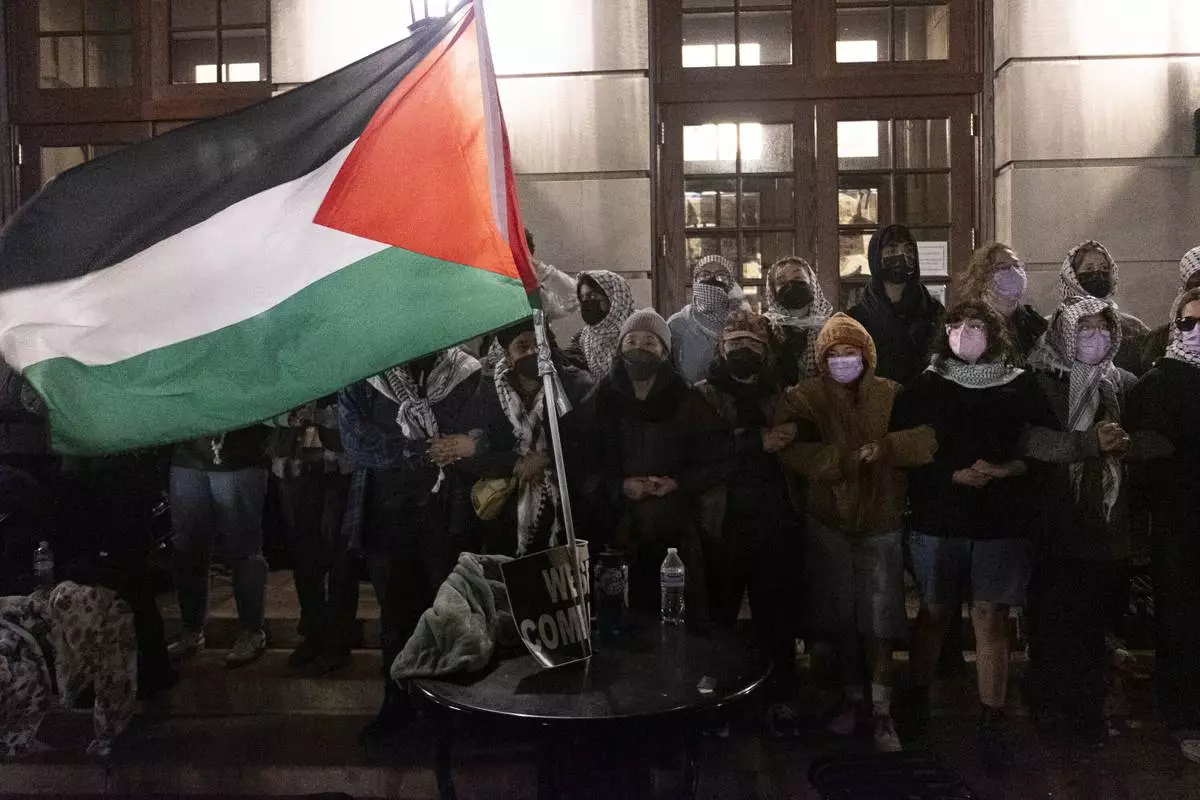
Pro Palestinian students lock arms, sing and chant as they braced for New York Police Department officers to raid campus after Columbia University President Minouche Shafik called on the NYPD to dismantle encampments and remove individuals from Hamilton Hall, Tuesday, April 30, 2024 in New York. (Seyma Bayram via AP)

Students try to prevent the Gaza Solidarity Encampment from taking over Hamilton Hall at Columbia University on Tuesday, April 30, in New York. Columbia Students for Justice in Palestine called for mobilization close to midnight before taking over the hall. (Marco Postigo Storel via AP)

Officers with the New York Police Department stand outside Columbia University's Hamilton Hall as they disperse Pro-Palestine students and protestors occupying Hamilton Hall on Tuesday evening, April 30, 2024 in New York. Members of the occupation took over Hamilton Hall in the early hours of Tuesday morning. (Seyma Bayram via AP)

Pro Palestinian students lock arms, sing and chant as they braced for New York Police Department officers to raid campus after Columbia University President Minouche Shafik called on the NYPD to dismantle encampments and remove individuals from Hamilton Hall, Tuesday, April 30, 2024 in New York. (Seyma Bayram via AP)

Students in the "Gaza Solidarity Encampment" on Columbia University's West Lawn gather for a meeting on Tuesday evening, April 30, 2024, in New York shortly before New York Police Department officers stormed the campus. Columbia University President Minouche Shafik authorized the NYPD to enter campus to dismantle encampments by Pro-Palestine students and to remove individuals occupying Hamilton Hall. (Seyma Bayram via AP)
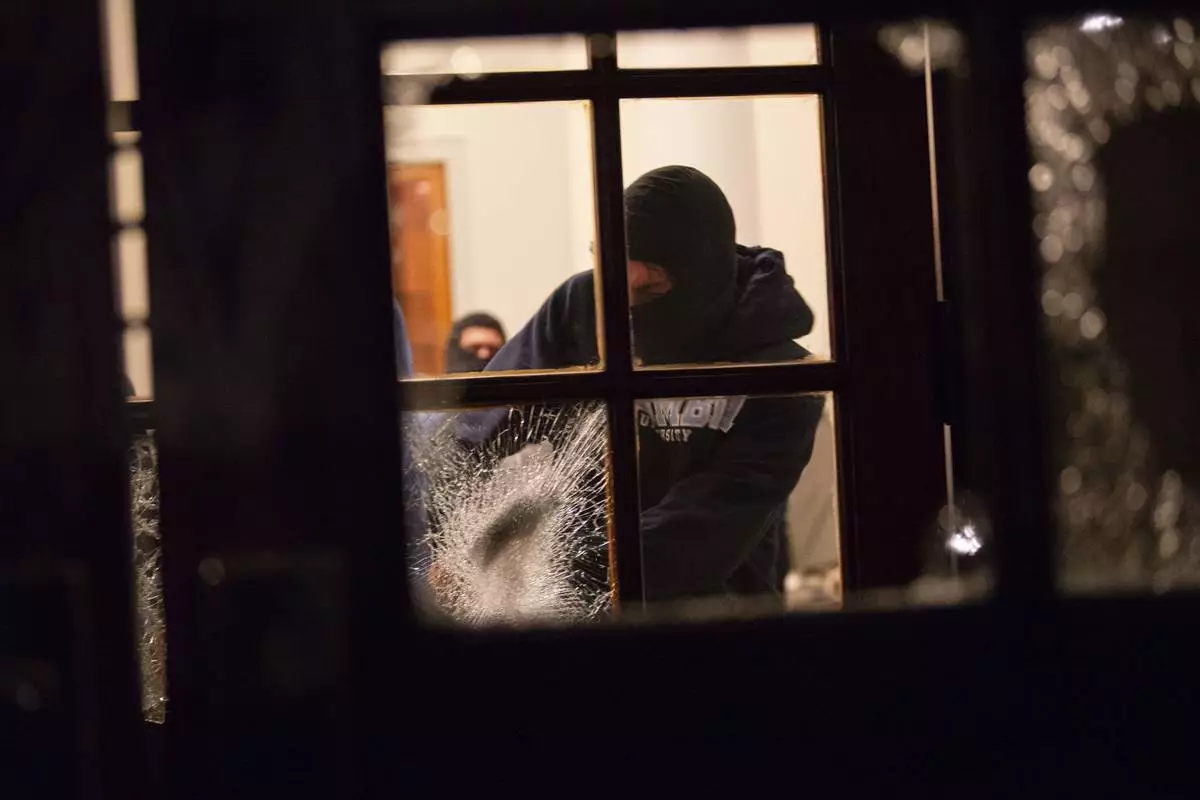
Students with the Gaza Solidarity Encampment break the doors to the entrance of Hamilton Hall at Columbia University after taking over it on Tuesday, April 30. Columbia Students for Justice in Palestine called for mobilization close to midnight. Students have been occupying part of campus since Wednesday, April 17, around 4 a.m. Calling for the university to divest from institutions that have ties to Israel. (Marco Postigo Storel via AP)

Students with the Gaza Solidarity Encampment take over Hamilton Hall at Columbia University naming it Hind's Hall, on Tuesday, April 30, 2024 in New York. Columbia Students for Justice in Palestine called for mobilization close to midnight. Protesters named it Hind's Hall as an homage to Hind Rajab, who was found dead 12 days after she called for help in Gaza. Students have been occupying part of campus calling for the university to divest from institutions that have ties to Israel. (Marco Postigo Storel via AP)

Pro-Palestine student activists face off with New York Police Department officers during a raid on Columbia University's campus at the request of Columbia University President Minouche Shafik on Tuesday evening, April 30, 2024 in New York. NYPD officers, including those from the police department's Strategic Response Group, arrested approximately 100 people as they dismantled encampments and removed individuals occupying Hamilton Hall. (Seyma Bayram via AP)

Students with the Gaza solidarity encampment block the entrance of Hamilton Hall at Columbia University after taking over it on Tuesday, April 30, 2024 in New York. Columbia Students for Justice in Palestine called for mobilization close to midnight. Students have been occupying part of campus since calling for the university to divest from institutions that have ties to Israel. (Marco Postigo Storel via AP)
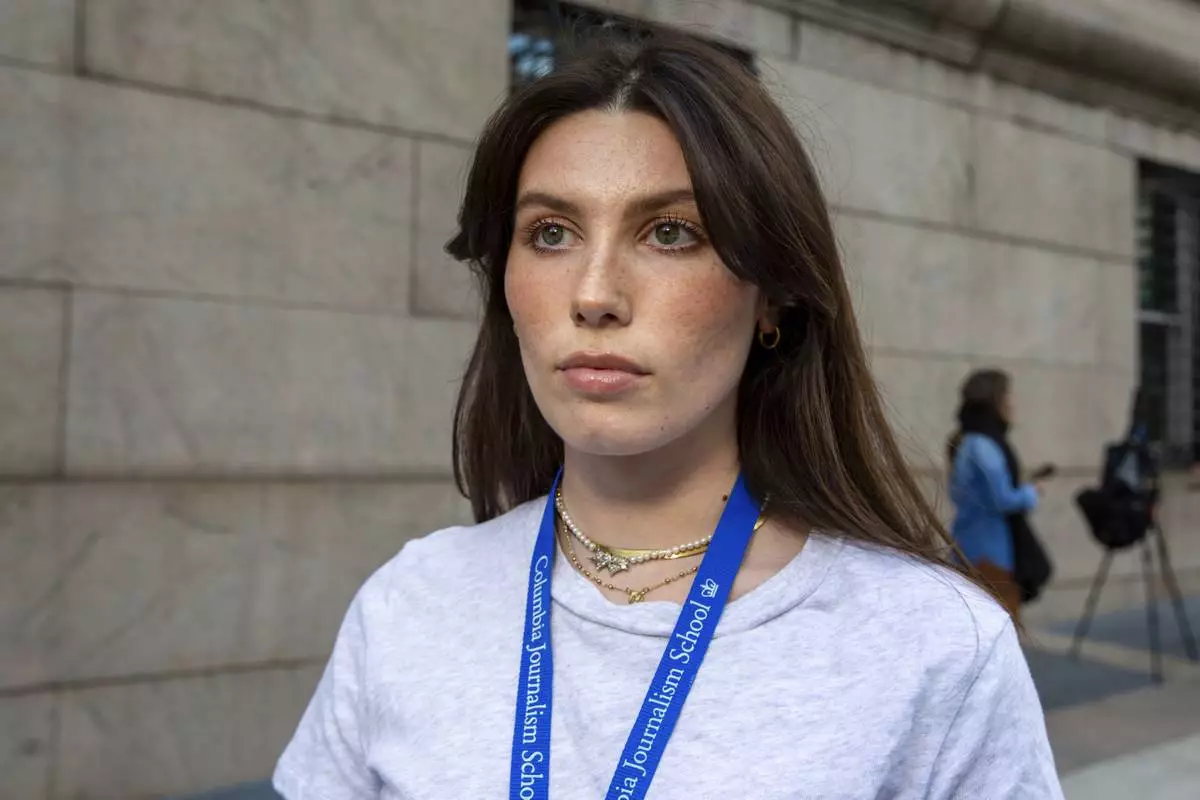
Columbia Journalism School student Cecilia Blotto poses for a photo in front of Hamilton Hall on Wednesday, May 1, 2024, in New York, where, hours earlier, New York police burst in to break up a demonstration by protesters who had occupied the building. (AP Photo/Ted Shaffrey)
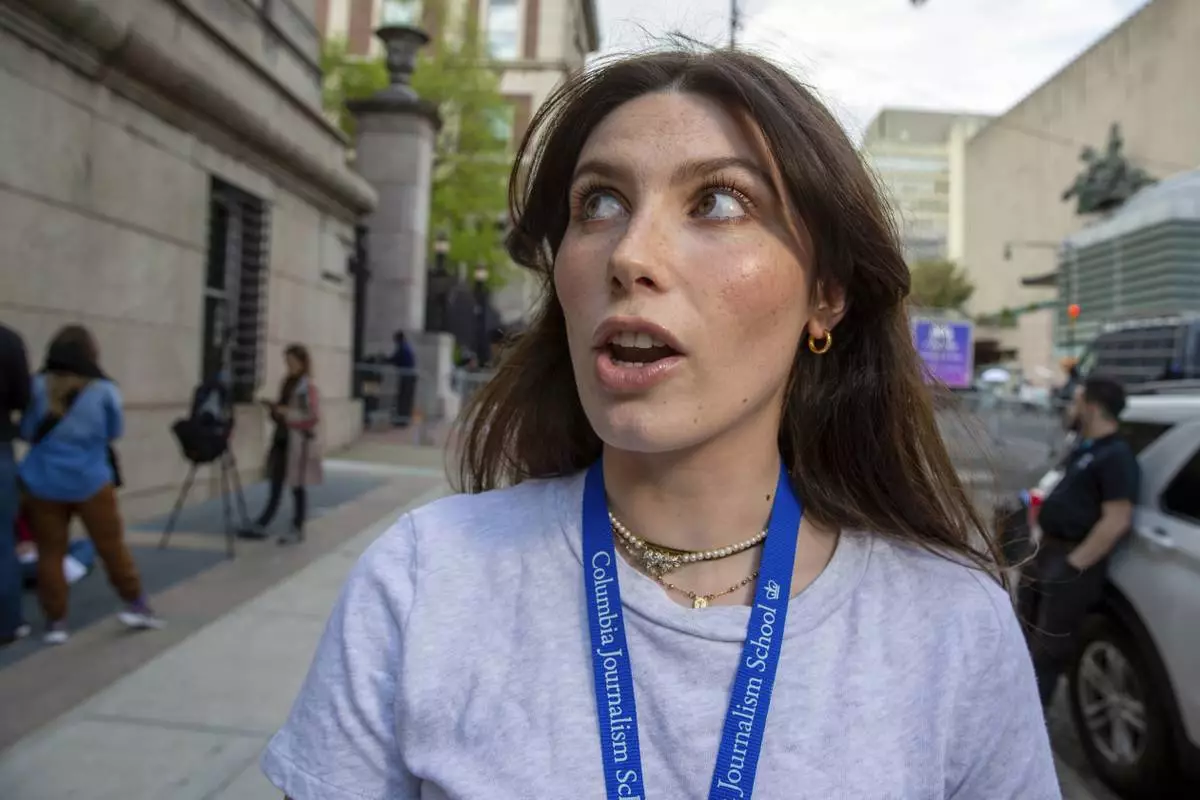
Columbia Journalism School student Cecilia Blotto speaks during an interview in front of Hamilton Hall on Wednesday, May 1, 2024, in New York, where, hours earlier, New York police burst in to break up a demonstration by protesters who had occupied the building. (AP Photo/Ted Shaffrey)
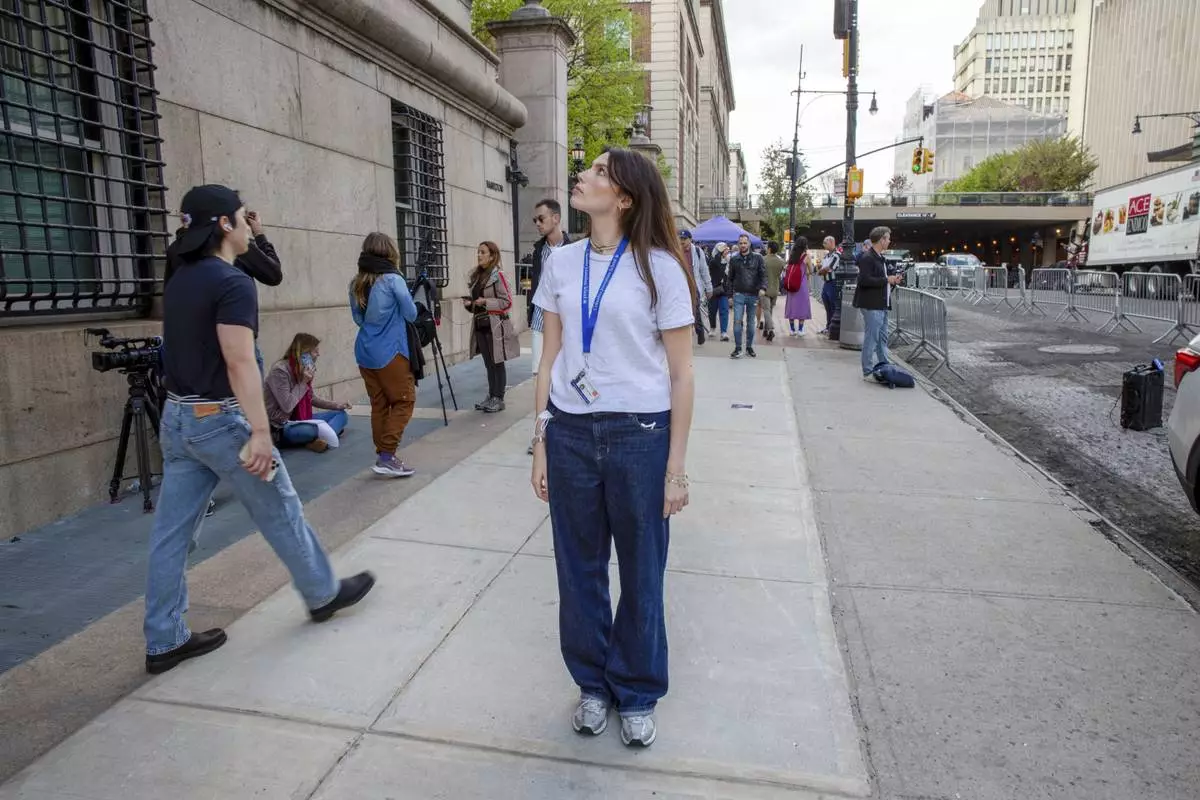
Columbia Journalism School student Cecilia Blotto stands in front of Hamilton Hall on Wednesday, May 1, 2024, in New York, where, hours earlier, New York police burst in to break up a demonstration by protesters who had occupied the building. (AP Photo/Ted Shaffrey)

















